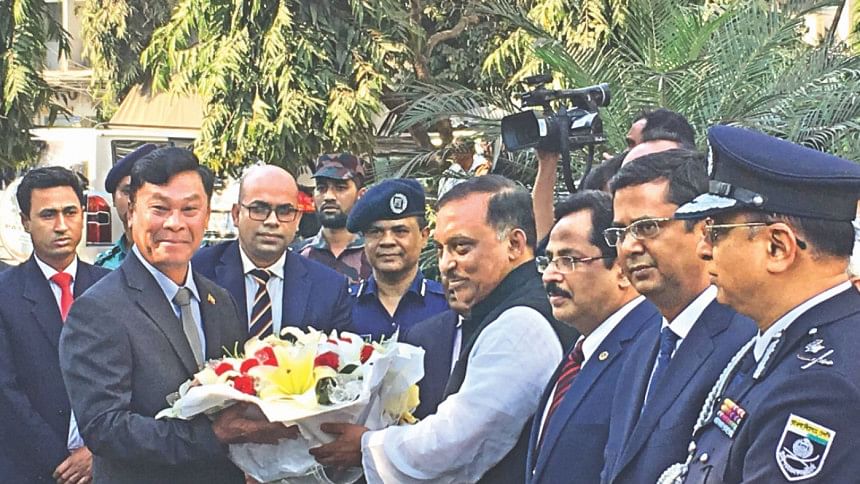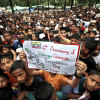Rohingya Repatriation: First list handed to Myanmar

With the process of Rohingya repatriation caught in a limbo, Bangladesh yesterday handed Myanmar a list of 8,032 refugees from 1,673 families who are likely to be the first batch to return to their homeland.
This development came at a meeting between Bangladesh Home Minister Asaduzzaman Khan and his Myanmar counterpart Lt Gen Kyaw Swe at the home ministry in Dhaka.
"They [the Myanmar authorities] demanded a family-wise list through the foreign ministry. We have handed over the list of 8,032 Myanmar citizens from 1,673 families. They are taking preparation to take back their nationals," said the home minister, emerging from the three-hour meeting that started around 3:00pm.
The minister, however, could not give a specific timeframe for the much-awaited repatriation. "No specific date came at the meeting, but we hope the process would begin very soon," he said.
If authenticated by the Myanmar government, this would be the first group of refugees to be taken back by the country amid global concern over the repatriation climate and safety of the returnees.
Asaduzzaman said the Myanmar side cordially accepted the list and the way they expressed their sincerity made Bangladesh believe that they might take back their citizens.
The repatriation was supposed to begin last month as per a bilateral agreement, but a pre-condition set at the eleventh hour held up the process.
The deal inked on November 23 had called for the repatriation to begin in 60 days. But, during a meeting on January 16, Naypyidaw demanded a family-wise list and Dhaka agreed to provide it.
Bangladesh's passport department has been conducting biometric registration of the refugees as individuals since the early days of the influx in late August, but that was not done family-wise.
After the January 16 meeting, the office of Refugee Relief and Repatriation Commissioner began preparing the list of families based on the UN Refugee Agency's data and the biometric registration of the Rohingyas.
"We are expecting to complete the list of refugee families in a month," Refugee Relief and Repatriation Commissioner Abul Kalam told The Daily Star on Tuesday.
After Myanmar verifies the list and sends it back with feedbacks, Bangladesh will arrange the repatriation, he added.
Yesterday, Lt Gen Kyaw Swe did not make any comment to the newsmen after the meeting that ended around 6:15pm. He left the ministry waving and smiling.
Home Minister Asaduzzaman said the Myanmar delegation came here with a positive mood and the meeting was very fruitful.
He said Bangladesh requested Myanmar to create a congenial atmosphere in trouble-torn Rakhine State. Otherwise, the Rohingyas would enter Bangladesh again.
The minister noted that a meeting would be held in Myanmar on February 20 to decide on the return of around 6,500 Rohingyas now staying along the zero line.
At yesterday's meeting, both sides discussed the issue of security of the Myanmar nationals after their repatriation in light of Prime Minister Sheikh Hasina's five-point proposal and Kofi Annan Commission report.
The Bangladesh side requested the Myanmar minister to take measures to stop killing along the border and implement the agreement on border patrolling.
Responding to a query that Rohingyas are still entering to Bangladesh, Asaduzzaman said, "We have informed them [Myanmar] about the matter and they said that they will stop this influx."
Nearly 700,000 Rohingyas have crossed over into Bangladesh since a military offensive began in response to an insurgent attack on August 25 last year. More than 300,000 others, who crossed over from Myanmar in the previous years, are also staying in Bangladesh.
With horrific accounts of rape, extrajudicial killing and arson, Rohingyas took shelters at makeshift camps in Ukhia and Teknaf in Cox's Bazar, creating a never-seen-before humanitarian crisis.
Also at the meeting, Bangladesh identified 49 Yaba factories inside Myanmar and requested the country to shut them down.
"Bangladesh and Myanmar agreed to shut down Yaba factories in Myanmar. We've identified 49 Yaba factories and the list was handed over to them. They're trying to close down the factories and sought support from Bangladesh," he said.
They also discussed the combined operations on both sides of the border to check the rapid spread of Yaba, a highly addictive narcotic.

 For all latest news, follow The Daily Star's Google News channel.
For all latest news, follow The Daily Star's Google News channel. 








Comments